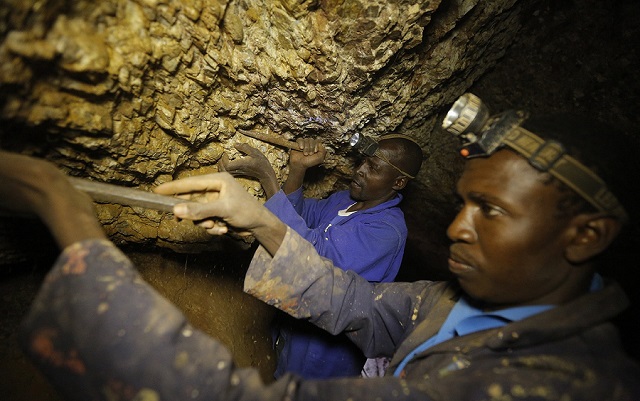In July the Ugandan Government said exploration surveys in the country had revealed vast estimated gold deposits of around 31 million tonnes. Of the behemoth find, around 320,158 metric tonnes are refined gold, with an approximate value of $12.8tn.
The discovery, identified by aerial surveys, could be a boon for Uganda, which is currently a net importer of gold. It will also likely make “significant waves” in the global gold market, according Jon White, director of Gold Traders, a London-based firm which buys and sells the precious metal.
Yet this disruption could bring as many challenges as benefits, from oft-heard concerns within the sector about international mining projects failing to deliver benefits to local people, to more unique issues, such as potential disruption of the global gold industry in general.
Overseas investment
A licence for production of part of the gold deposit has already been granted to the Wagagai Gold Mining Company, a Chinese firm. The Uganda Investment Authority announced a ground-breaking ceremony at the mine in October last year, and noted at the time that Wagagai’s initial investment reached $50m, including for a refinery, which has since risen to $60m.
The Ugandan Government is looking to develop domestic mining within its borders to boost the economy. Through the Uganda Free Zone Authority (UFZA), a government agency established for the purposes of creating opportunities for export-oriented investments, is trying to attract foreign investors to sector, which is otherwise dominated by informal mining, by offering tax incentives.
The Wagagai mine and refinery has been granted a ‘free port zone’ under the UFZA, making it exempt from import and export tax. The move may well encourage investment, but has led some to question how the country will benefit – or whether it will benefit enough – from the project.
New legislation
Uganda hopes rewards will come through its newly-overhauled mining code, the Mining and Minerals Bill, which parliament passed this February and is waiting to be signed into law by the president. The code will see the establishment of the Uganda National Mining Company, which, under the new bill, will hold 15% free equity in all large and medium mining ventures, as well as have the right to buy up to 20% of extra shares in the mining ventures at the commercial rate.
“The new law is intended to provide a robust, predictable and transparent legal regime, improve mining and mineral administration and business processes, ensure efficient collection and management of mineral revenues, promote value addition to minerals and increase mineral trade,” the government has said.
However, gold experts Aaron Hoddinott and Alexander Smith of Pinnacle Digest noted that such legislation introduces the threat of nationalisation to the deposits. This is not uncommon in other countries, and raises the prospect of the vast riches of the deposits becoming tied to the whims of the national government.
The bill is also intended to end widespread informal mining, from which the government receives no revenues. Under Ugandan law people can be convicted, imprisoned and face fines if caught illegally mining. Critics have said the move will render more than 20,000 miners effectively jobless, as well as impacting on those indirectly making money through the informal sector, raising question as to who will truly benefits from this vast gold discovery.
Delivering domestic benefits
In response, the government has appealed to gold mining investors to use local labourers and train them where necessary to help in the fight against poverty. Uganda’s GDP per capita is currently just $858.1, more than just 18 countries in the world, according to the World Bank.
Wagagai’s activities are expected to create 3,000 direct jobs, though the specifics remain unclear, and the company will construct a new refinery, valued at $200m according to the government.
However, the work of refineries in the region has been dogged by allegations of corruption, posing a threat to local security and dissuading foreign investment.
In March, the US imposed sanctions on Belgian businessman Alain Goetz and a network of companies tied to him, including the African Gold Refinery in Uganda. The refinery was set up in 2014 but is accused of being involved in the illicit movement of gold from the Democratic Republic of Congo.
Challenges remain
Smith and Hoddinott have also argued that the validity of the gold reserves in Uganda first need be proven, with geophysical and geochemical surveys and analyses done to date representing only “step one of 20 exploratory steps needed”.
Furthermore, the development of any new mining deposit in Uganda isn’t without its risks or challenges; mining activities by both Chinese and other firms in Karamoja, where much of the gold said to be identified is located, have in the past created tensions with local communities.
Mining in the region has been subject to a Human Rights Watch investigation, which was critical of miners for environmental damage caused and not providing compensation for those whose land was impacted by the work.
The government has tried to address such tensions in the new bill by providing for the participation of host communities in the entire decision-making chain of mining, including information on licences, environment and social impact assessments provided both at the national and local government levels. It also states that training and employment should be prioritised for host communities. However, it remains to be seen how this will work out in practise when the bill finally becomes law.
For foreign mining firms looking to operate in Uganda there will also likely be political and corruption risks to consider. Uganda joined the Extractive Industries Transparency Initiative in 2020 but is yet to be assessed.
Potential growth and potential disruption
Globally, White says there has been a decline in the value of gold, particularly in the US market, as the strength of the dollar increases, and this discovery could ultimately undermine its value further.
“The bottom line is larger gold reserves tend to lower the value of the metal, due to the increased supply,” White says.
Yet gold remains a safe haven for investments, and is still valued for its ability to protect investors from economic volatility caused by new economic policies or geopolitical shifts.
“Therefore, it’s likely that by the end of 2022, when this newly discovered gold will begin to be refined and sold, it will certainly boost the Ugandan economy and bring about a significant shift in the global market,” he continues.
“Whether this will cause prices to rise, or fall will depend on how easy it is to supply this new stock of gold, the economic and political situation at the time, and global interest rates and inflation levels.”
Smith and Hoddinott’s take is that extraction at the deposits are not ”even close to a done deal” and will likely be difficult to get out the ground. They went on to point out that the world only produces around 3,000 metric tonnes of gold annually and 80 – 100 grams of gold per ton, as is claimed for this reserve by the government, is “insane” and “extremely optimistic”. Indeed, $12tn exceeds the entire market cap of all gold mined ever.
If there was more evidence of the deposits’ existence, they add, it could see the price of gold drop by “50% overnight,” however, echoing White’s sentiment, and highlighting the uncertain future of these vast gold deposits.







